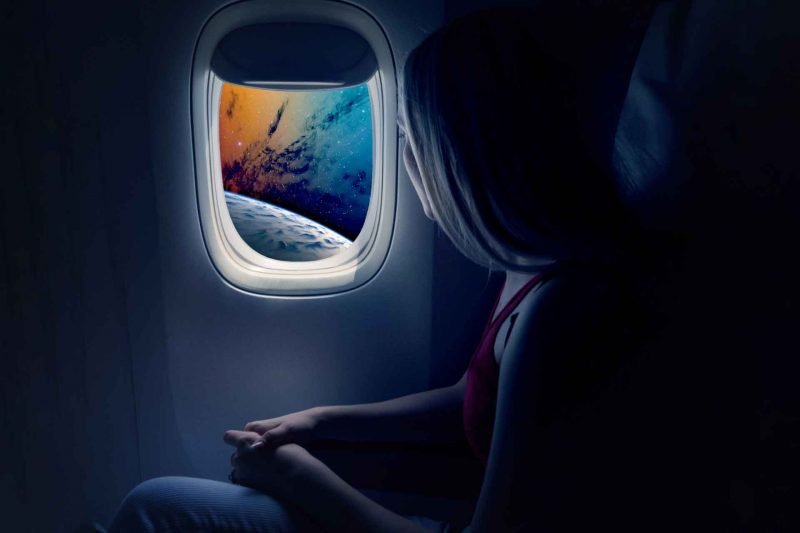Travelers have been dreaming of adventuring into space ever since Neil Armstrong walked on the moon in 1969. Just like people initially doubted the possibilities of air travel and passenger vehicles, many have scoffed at the idea of space tourism.
However, we’ve seen some pretty incredible advancements in the space industry in recent years. So is space tourism the future of travel? The answer might surprise you!

What Is Space Tourism?
For the last several decades, you needed to go through months or even years of training before you could rocket off Earth and into space. However, a new niche segment of the aviation industry is attempting to change that.
While space travel was once for NASA and its elite group of astronauts, space tourism aims to make it more attainable for recreational, leisure, and business trips into space. It’s currently capable of taking everyday people to the edge of space. However, the ultimate goal is much, much further in.
Space tourism has been occurring since the late 1990s in other countries but is gaining popularity in the United States. Private companies like Blue Origin and SpaceX, companies owned by billionaires Jeff Bezos and Elon Musk, are the two leading companies paving the way for the industry. Some reports suggest that this industry will show steady growth between 2023 to 2027.
Will Space Tourism Ever Be Possible?
Space tourism is somewhat already possible, but it’s not cheap. You have to have big bucks or a reputation that will attract tremendous attention for the companies to consider sending you into space.
For example, Blue Origins launched celebrity William Shatner into space on October 13, 2021. At 90 years old, the man who played James Kirk on “Star Trek” finally got to experience “where no man has gone before.”

Other individuals launched into space include Richard Branson, Jeff Bezos, and hall of fame NFL player Michael Strahan.
One celebrity, Pete Davidson, was scheduled to embark on a Blue Origin flight on March 23, 2022, but the launch schedule changed. He could no longer participate in the mission. The future of space travel and tourism looks promising.
How Will Space Tourism Look in the Future?
Dennis Tito was the first civilian to visit the International Space Station in 2001. The cost of his tourist trip was an astounding $20 million.
However, SpaceX, Blue Origin, and Virgin Galactic will drastically reduce the costs. These companies have estimated that they can begin offering space tourism trips for as little as $200,000.
This is still a tremendous amount of money to most of us. But it’s a drop in the bucket compared to the price a couple of decades ago.
If you think these costly trips last for days or weeks, you will be disappointed. Currently, they typically last approximately 10 minutes. Space tourists enjoy about three minutes of weightlessness before returning to space.
The future of space tourism looks to expand the time tourists spend there. The hope is for it to be days, weeks, months, or if Elon Musk has his way, permanently.
Musk and his company, SpaceX, aim to create a reusable transportation system that will allow transportation to and from the red planet of Mars. The goal would be to send humans to the planet to start creating an infrastructure capable of making the planet a possible habitat for human life.
While we’re not 100% sold on the idea, it’s an out-of-this-world idea for humans to be multi-planet species.
What Are the Benefits of Space Tourism?
While many people may not buy into the idea that space tourism is a good idea, there are many benefits. It encourages competition and innovation amongst highly competitive businesses and individuals. When companies compete to be the best, consumers ultimately get better performing and more reliable products.
Even if traveling into space doesn’t become common, we could be looking at a new means of transportation on earth. Elon Musk claims the new Starship could reduce the seven-hour and 20-minute flight from New York to Paris, France, to only 30 minutes.
The impact of traveling at this speed would be a game changer for tourism, but especially for international business relations.
HOT TAKE
Speaking of speeding up travel on Earth, is Elon Musk’s Hyperloop becoming a reality?!
What Are the Disadvantages of Space Tourism?
One of the biggest disadvantages of space tourism is that it’s not likely to be accessible to everyone anytime soon. With the hope of bringing the cost down to around $250,000, those earning lower wages would still be saving for several years. It’s just not feasible or practical for the average person.
Even if the price drops substantially, it will still be very dangerous. Launching humans into space isn’t easy to do.
Blue Origin recently experienced a major failure seconds after launching its New Shephard rocket. Luckily, no humans were onboard, and the crew capsule was safely deployed away from the spacecraft.
Just like some of the most beautiful landscapes here on Earth, it’s only a matter of time before humans ruin them. Space tourism will no doubt result in a drastic increase in space debris. This debris can be very dangerous to astronauts and the various vehicles traveling in space.
How Will Space Tourism Affect the Economy?
Space tourism can potentially have a major impact on the global economy. Experts estimate that the industry could grow to $1.7 billion by 2027.
Alan Ladwig, author of “See You in Orbit? Our Dream of Spaceflight,” referred to the $1.7 billion growth and said, “That would generate a significant number of new jobs and capabilities in the emerging space tourism economy.”

Is Space Travel Important to the World?
For the general public, space travel is of little concern. While some, like Elon Musk, are busy coming up with an exit plan for when Earth throws in the towel, many others think our focus should be on protecting our current planet.
Many feel that these individuals need to adjust their priorities. The massive amount of money invested in exploring space could have a huge impact on some of the humanitarian needs impacting people all over the world.
It’s hard for most people to care about sending multi-millionaires and billionaires into space when they’re struggling to pay rent or put the next meal on the table for their family.
Is Space Tourism a Good Idea?
Just because space tourism isn’t likely to be readily available to the average person anytime soon doesn’t make it a bad idea. Being able to make advancements when it comes to transportation will eventually benefit everyone in every tax bracket.
Growing the private sector for space tourism allows private industries the freedom and control to quickly and efficiently make improvements. That will be without going through government red tape every step. This helps avoid tax dollars from getting wasted and instead puts the ownership on private companies.
So while we’re likely not going to space anytime soon, it will be fun to sit on the sidelines and watch these companies compete against each other to grow the industry.
If You Want the Latest Travel News, Join Our Mailing List
Don’t rely on biased RV industry news sources to keep you informed. Stick with Nomadic News. We publish articles and breaking stories that matter to you every weekday.










